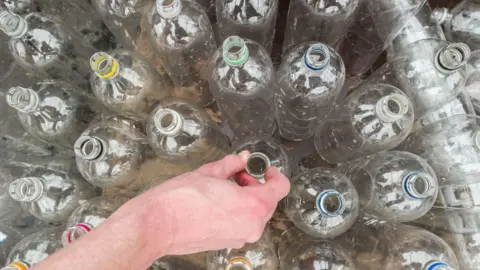 PA Media
PA MediaThe political fallout from the Scottish government’s beleaguered bottle return scheme has been considerable, but the legal fallout could be equally as significant.
A waste management firm is suing the Scottish government for almost £170m over the collapse of the plans.
The Court of Session in Edinburgh has been told Scottish ministers were negligent when they claimed the scheme was viable.
But lawyers for the government say the company was aware of the risks involved and the claim should be dismissed.
Who is suing the government?
The scheme, already postponed, was supposed to launch in August 2023. A matter of weeks before then, it was pushed back to at least October 2025.
That came following a dispute with the UK government, which refused to grant the scheme the go-ahead unless it conformed to a UK-wide approach excluding glass.
The firm that was due to manage the scheme, Circularity Scotland, collapsed. A non-profit company funded by the drinks industry, it folded with debts and liabilities of more than £86m.
One of its main creditors, Biffa Waste Services, is now suing the government.
The firm is seeking up to £166.2m of reparations, including about £115m in projected profits over a 10-year contract with Circularity Scotland.
It said it had spent about £50m in preparation for the scheme – including buying vehicles and specialist equipment, leasing vehicle depots, processing sites and taking on extra staff. The company wants to be reimbursed for that outlay, too.
What are the arguments?
In court summons, Biffa argued it was given “clear assurances” from former Green minister Lorna Slater – who has since left government after the end of the SNP-Green power-sharing agreement – that the scheme would go ahead.
The firm cited a letter sent by Slater in May 2022 reinforcing the government’s commitment to the plans.
Biffa said it signed its contract with Circularity Scotland as a “direct” result, and in the belief that ministers had “taken all necessary steps” to ensure it would be deliverable.
However, the government denied the assurances in the letter were neither “new nor unique”.
 PA Media
PA MediaIts lawyers said Biffa was taking a commercial risk – and should have been aware of the legal challenges involved.
The Court of Session case is expected to last for two days before the judge retires to consider a decision.
If Biffa is successful, that could leave a sizeable hole in the government’s finances.
Alternately, a victory for the government in the courts could leave a major employer out of pocket.
What was the scheme?
Deposit return schemes are used in many countries to encourage people to recycle drinks containers such as bottles and cans.
Under the government’s plans, a 20p deposit was be added to all single-use drinks containers made of PET plastic, metal or glass.
Consumers could reclaim the deposit by returning the container to retailers and hospitality premises that sell such single-use products to take away, or to specially-designed reverse vending machines.
In recent months, ministers around the UK have been working on a four-nations scheme – but this has been delayed by two years to October 2027.
Political fallout
Lorna Slater said she had no choice but to delay the deposit return scheme, accusing Conservative ministers of sabotage.
However, a Scottish government review from March 2023 reported it was fraught with problems months before the UK government halted it.
In August, it was revealed that the publicly-owned Scottish Investment Bank made an £8m loss on Circularity Scotland.
Speaking that month at the SNP conference, the party’s Westminster leader Stephen Flynn cited the scheme among “self-inflicted wounds” suffered in the general election campaign.
He told reporters: “While the Scottish people were in the midst of a cost of living crisis, we were having an argument with the UK government about a bottle bank.”







